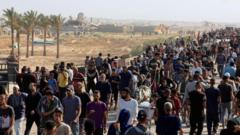In the latest round of violence, the loss of children waiting for basic necessities underscores the dire living conditions faced by residents.
**Tragedy Strikes: Family Grieves as Airstrike Claims Young Lives at Water Distribution Point in Gaza**

**Tragedy Strikes: Family Grieves as Airstrike Claims Young Lives at Water Distribution Point in Gaza**
A father's heart-wrenching tale following a deadly strike highlights the ongoing humanitarian crisis in Gaza.
Ten individuals were killed during an Israeli airstrike near a water distribution point in Nuseirat refugee camp, as families sought to secure vital supplies amidst escalating conflict. Mahmoud Abdul Rahman Ahmed shared his devastation over the loss of his son, Abdullah, who was merely "searching for a sip of water" when the tragedy unfolded on a seemingly ordinary Sunday morning.
"That area was inhabited by displaced people, exhausted by the war and the imposed siege," Mahmoud recounted, detailing the community's dire need for basic resources. "The children, including Abdullah, lined up with empty jerrycans and parched lips, waiting for water."
Seconds after the gathering formed, warplanes struck without warning, targeting the water point, Mahmoud claimed. Graphic footage captured the chaos as bystanders rushed to aid the injured amidst the destruction, highlighting the brutal reality residents face daily in the region. Al-Awda Hospital reported that among the ten victims were six children, noting that Abdullah was not alone in his tragic fate.
In the wake of the airstrike, the Israeli military issued a statement indicating that the strike had aimed at a Palestinian Islamic Jihad operative but acknowledged a "technical error" led to the civilian casualties. "We regret any harm to uninvolved civilians," the military said, emphasizing that they were reviewing the circumstances surrounding the incident.
Yet, Mahmoud's pain resonated deeper than mere regret. He accused Israel of intentionally instilling fear, asserting, "It won't allow people to drink even the water they crave." The father lamented that along with dreams extinguished for his son and the other children, their basic rights to safety and security were being denied.
The ongoing water crisis in Gaza is exacerbated by the conflict and blockade, worsening living conditions even further. The UN has warned of a "human-made drought crisis," as residents now receive less than 15 liters of water per day, a stark contrast to basic emergency standards. Sam Rose, acting Gaza director for the UN agency for Palestinian refugees (UNRWA), noted that children must queue daily for minimal water rations.
The toll on civilians continues to escalate, with additional casualties reported from previous incidents, drawing attention to the tragic frequency of such losses. UNICEF's executive director condemned both recent incidents, urging a reevaluation of rules of engagement to adhere to international humanitarian standards.
As the UN Security Council prepares to address the ongoing crisis and its impact on children, conflicting narratives persist. Israel's representative shifted blame to Hamas, while Mahmoud underscored the need for an end to hostilities, stating, "We are victims... The ongoing massacre in the Gaza Strip must stop."
"That area was inhabited by displaced people, exhausted by the war and the imposed siege," Mahmoud recounted, detailing the community's dire need for basic resources. "The children, including Abdullah, lined up with empty jerrycans and parched lips, waiting for water."
Seconds after the gathering formed, warplanes struck without warning, targeting the water point, Mahmoud claimed. Graphic footage captured the chaos as bystanders rushed to aid the injured amidst the destruction, highlighting the brutal reality residents face daily in the region. Al-Awda Hospital reported that among the ten victims were six children, noting that Abdullah was not alone in his tragic fate.
In the wake of the airstrike, the Israeli military issued a statement indicating that the strike had aimed at a Palestinian Islamic Jihad operative but acknowledged a "technical error" led to the civilian casualties. "We regret any harm to uninvolved civilians," the military said, emphasizing that they were reviewing the circumstances surrounding the incident.
Yet, Mahmoud's pain resonated deeper than mere regret. He accused Israel of intentionally instilling fear, asserting, "It won't allow people to drink even the water they crave." The father lamented that along with dreams extinguished for his son and the other children, their basic rights to safety and security were being denied.
The ongoing water crisis in Gaza is exacerbated by the conflict and blockade, worsening living conditions even further. The UN has warned of a "human-made drought crisis," as residents now receive less than 15 liters of water per day, a stark contrast to basic emergency standards. Sam Rose, acting Gaza director for the UN agency for Palestinian refugees (UNRWA), noted that children must queue daily for minimal water rations.
The toll on civilians continues to escalate, with additional casualties reported from previous incidents, drawing attention to the tragic frequency of such losses. UNICEF's executive director condemned both recent incidents, urging a reevaluation of rules of engagement to adhere to international humanitarian standards.
As the UN Security Council prepares to address the ongoing crisis and its impact on children, conflicting narratives persist. Israel's representative shifted blame to Hamas, while Mahmoud underscored the need for an end to hostilities, stating, "We are victims... The ongoing massacre in the Gaza Strip must stop."

















